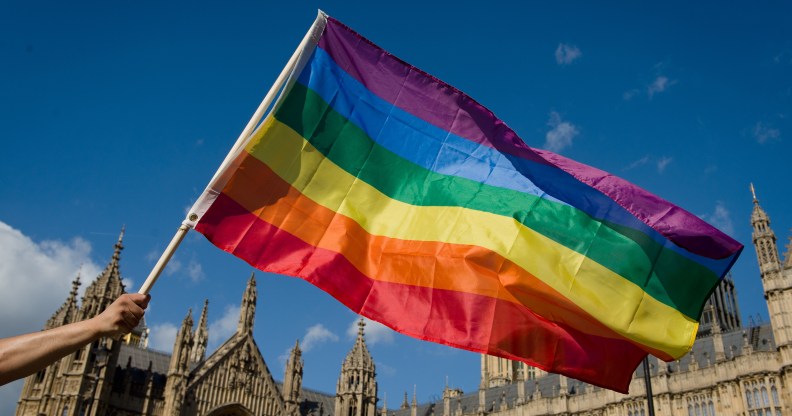Labour MPs get free vote on parts of embryology bill

A protester holds a rainbow flag outside the Houses of Parliament in central London on June 3, 2013, as protesters gather in support of same-sex marriage (LEON NEAL/AFP/Getty Images)
The Prime Minister has announced that MPs will be allowed to vote against parts of a government bill.
The Human Fertilisation and Embryology Bill is due before the Commons in the next few weeks.
MPs will get a free vote on three parts of the legislation: IVF research, saviour siblings and the creation of human-animal embryos.
Mr Brown said that he believes stem cell research has the potential to cure some diseases “that have afflicted mankind for centuries,” such as cancer and heart disease.
“I have always said that although I attach huge importance to this legislation – to save lives and helping to cure and treat diseases – we respect the consciences of every member of Parliament as they decide how to cast their vote on this,” he said at today’s launch of the local election manifesto.
“On the three issues where, for the first time, these ethical issues are being debated in Parliament in this new way.
“Exercising your conscience will mean for Labour Party members a free vote.
“But the bill itself cannot be subject to a free vote because there are so many other changes that I believe are necessary as part of building up the research framework of our country and, of course, creating the right ethical framework for the development of embryo research.”
While Gordon Brown has bowed to pressure from the Roman Catholic church and allowed MPs a free vote on certain aspects of the legislation, gay rights measures in the bill are expected to be whipped.
Labour and Lib Dem MPs are to get a free vote on parts of the bill.
The legislation was approved by the House of Lords in January.
The Human Fertilisation and Embryology Bill proposes new recognition of same-sex couples as legal parents of children conceived through the use of donated sperm, eggs or embryos.
A woman who gives birth and her civil partner will both be recognised as the parents of a child conceived through assisted reproduction.
Two men will be able to apply for a parental order to become parents of a child conceived through a surrogacy arrangement.
During its Report stage in the Lords there were strong objections for bishops and some Tory peers, but an amendment by Tory peer Baroness Deech seeking to retain the “need for a father” was defeated by 164 to 93.
For more information on saviour siblings click here.
For more information on human-animal embryos click here.

